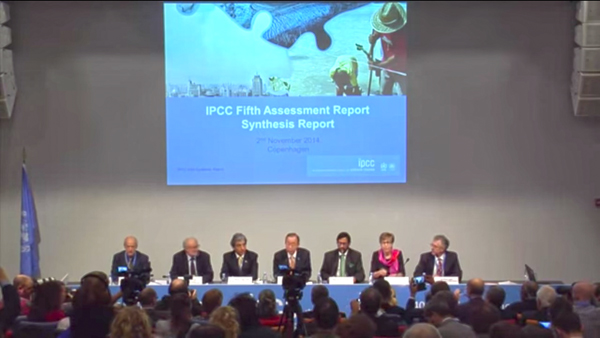What we do now and over the next decade to lessen our impact on the planet will determine our future. Doing nothing is not an option, says the IPCC. [11 November 2014 | Peter Boyer]
A sprightly octogenarian scholar and a former car radio installer with a passion for flying, an unlikely team if ever there was one, took me on a trip down memory lane last week.

UN Secretary-General Ban Ki-moon (centre) officially launches the AR5 Synthesis Report in Copenhagen on 2 November
I didn’t read Paul Ehrlich’s best-selling book The Population Bomb when it was published in 1968, but a few years later when my first child was born I felt its huge impact. We all got to hear about the political movement it helped to spawn, ZPG, for zero population growth.
The book’s dark prediction that over-population would bring mass starvation by the 1980s badly underestimated the impact of the post-war “green revolution”, which trebled world food yields. In the popular media Ehrlich became something of a laughing stock.
But Ehrlich, now 82, doesn’t know how to take a backward step. Treading the boards of the University of Tasmania’s Stanley Burbury Centre last week at his only public meeting while in Australia, he was as articulate, forthright and unapologetic as ever.
In his sights is the failure of politicians in Australia, Canada and his own United States to recognise the global climate and environmental crisis. The US Congress’s newly-elected, climate-blind Republican majority was made up of “morons”, he told his capacity audience.
Also on the double bill that night was Dick Smith, who turned his car radio business into a chain of electronics stores before selling out to Woolworths. As well as indulging his lifelong passion to explore the world from the air, he’s now busy educating us about the perils of over-population.
Ehrlich is gloomy about our future, but not Smith. He firmly believes that we have it in us to break our addiction to the false and pernicious idea that perpetual economic growth is possible. He thinks that Australians are beginning to “get it”, and that leaders will follow.
The Intergovernmental Panel on Climate Change offers some support for Smith’s optimism. Its latest “synthesis report” has found that undertaking sufficient mitigation to keep warming within acceptable limits would reduce economic growth by a very acceptable 0.06 per cent.
But the report, which distils and updates the thousands of pages of detailed analysis comprising the IPCC’s fifth comprehensive climate review released earlier this year, also supports Ehrlich’s concern that countries’ continuing failure to enact effective measures radically increases the challenge.
We’re running out of time, says the IPCC. To keep the cost of abatement within manageable limits we have to turn around our rising emissions trajectory within a decade. The longer we wait, the more it will cost us, and the more likely we are to suffer irreversible climate change.
Continuing as we are now, the report says, will deliver us a world close to 5C warmer than it was 100 years ago, along with a very unstable climate, vanishing food and water, irreversibly damaged ecosystems and biodiversity, and human misery and mayhem on a global scale.
We’re now experiencing more high temperature extremes and fewer cold extremes. As the century progresses, extreme rain events and heat waves will happen more often, and the heat waves will be hotter and last longer.
We already know what it will be like, says ANU epidemiologist Dr Elizabeth Hanna, an expert on the impact of global warming on human physiology. She told the ABC’s Radio National Breakfast that thousands of people are already dying because the world is too hot for them.
Human bodies generate heat, and ten times more heat when we move, which is why we prefer temperatures around 22C. Business as usual will lift summer extremes in Australia above 50C for prolonged periods, over 13C above humans’ core temperature and 28C above our comfort zone
How will our bodies deal with this? Not well, says Hanna. “If the temperature is close to our core temperature, or hotter, we cannot shed this extra heat. Our core temperature gets too high and we go into heat stress and ultimately death.” End of story.
ENERGY MINISTER Matthew Groom feels I should have acknowledged his effort in helping to persuade Canberra to retain a Renewable Energy Target. However, the RET that’s now the preferred option is not today’s legislated RET but a lesser one that would disadvantage hydro, solar and wind.
His public statements on the RET have focused on the Labor opposition. His target should have been the federal government. Besides trying to kill off the RET, it deprived Hydro Tasmania of many millions of dollars this financial year with the repeal of the carbon price.
We need both him and Will Hodgman to find it in them to break a taboo and confront the prevailing attitude in their party, and particularly in the Abbott government, that our rising carbon emissions are of no consequence. The continuing silence is costing us dearly.
